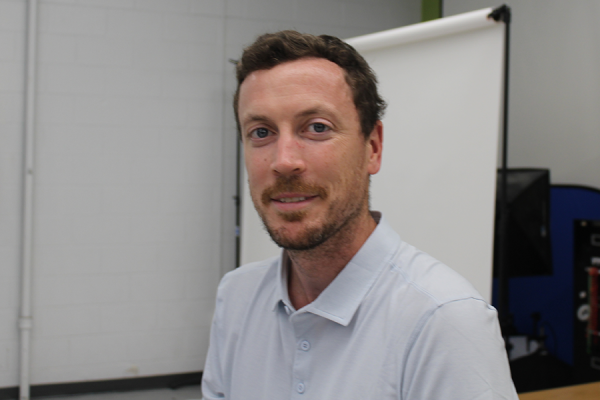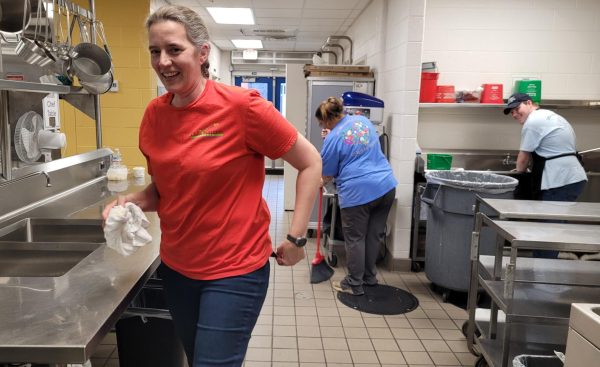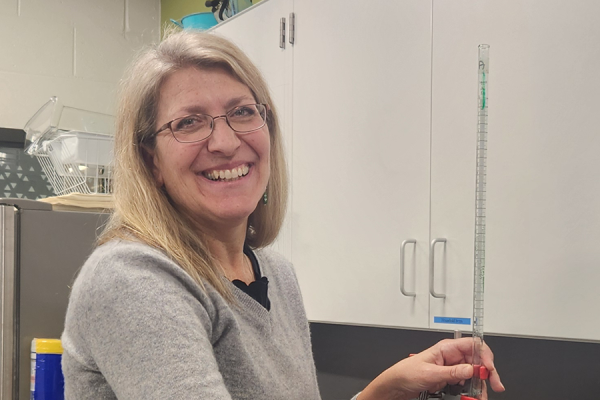Student and Faculty Thoughts on Cheating and Cyberbullying
Credit: Patrick Andrews
Tommy Lee and Josh Meeks check a phone during TAB.
You know the big blue bird and the all too familiar white “f.” You’ve tweeted, retweeted, chatted, “snapchatted,” “facebooked,” blogged, Skyped, commented, posted, liked, disliked, friend requested, hashtagged, instagrammed and pinned items to your favorite boards. Be honest, you’ve probably done at least one of these today. The point is that social media is everywhere, and it is expanding every minute to new places, people and devices.
In the past few years, various social media sites have become a staple part of social diets, feeding people everywhere with information about their friends, news, sports and homework. However, social media also poses many possible dangers to people everywhere.
“Technology, it’s in your hands.” Assistant Principal Greg Domecq said. “It can be used for great things, or it can be used for not so great things.”
In general, high school students everywhere encounter some instances of cheating, whether it is over the Internet or in person.
“Cheating is presenting someone else’s work or ideas as your own on anything from homework to a test or paper, and it’s helping yourself or anyone else to have an unfair advantage, like discussing the content of a test or quiz you’ve already taken,” said Rebecca Ellis, an English teacher at Western Albemarle. This can be done over Facebook chat and text messages.
“I run into it every year, usually with kids who are stressed because of heavy course loads and placement in too many AP classes with serious reading requirements,” said Ellis. However, she cannot attest to cheating over social media because teachers are not involved in student affairs on such sites.
Junior Muhannah Hossain said that he does not think many students cheat over social media sites and that he does not see many, if any, people cheat via Facebook or Twitter. He noted that students would more likely use texting as a way to cheat because it is more accessible and private.
Brady Pittman, a senior at WAHS, said, “I don’t think [cheating] is a big problem over social media sites. It’s more of a problem handing people the actual paper.” However, according to a poll conducted of WAHS students (see charts to the left/right), only 56.9 percent of students agree that cheating is not a problem over social media sites.
Teachers such as Ellis still believe that cheating is definitely a problem. “I wish I could say that we didn’t have a problem, but we definitely do,” Ellis said.
Cyberbullying has also increased in recent years. However, guidance counselor Erin Rittenhouse said that it is not “rampant” at WAHS.
“I think it’s definitely picked up in the last few years,” Rittenhouse said. “When I first started here, I never heard anything about it, and I think in the last couple of years I have just a few more instances each year.”
Social media has psychological effects on both the “bully” and the “victim.” The existence of a cyber wall between the two makes people more likely to post comments that are hateful and cruel because they are not looking at others face-to-face.
“You can hide behind some name, and anonymity makes a lot of people brave,” Domecq said. “When I was a kid, when I went home, if somebody was being bullied, they went home and it was over.” However, with social media sites, the victims of cyberbullying have to endure the torment at home.
On September 4, 2013, a “student from another school division” made threats against a western student via Facebook. While these threats were idle, the administration had received prior warning and took precautionary measures to ensure the safety of students at WAHS, making the buses unload at the back of the school. Dr. John Werner, the new principal at WAHS, has tried to implement this “proactive” stance regarding threats to student security.
Werner said, “We had some information through social media sites… but it ended up being not what we thought it was.”
Werner believes in a bittersweet view of technology and social media, regarding the benefit of connection as just one aspect of the dual nature of social media. The other aspect is the danger of inappropriate content and interactions with people that may not have good intentions in mind. In an attempt to protect students, the Albemarle County School system has enacted new policies that allow the county to monitor web searches on school internet servers and access students’ school gmail accounts.
“It can be a wonderful thing to connect people and it… can hurt people as well, too,” Werner said.
Your donation will support the student journalists of Western Albemarle High School. Your contribution will allow us to purchase equipment and cover our annual website hosting costs.

Patrick Andrews, more commonly known to strangers as “that blonde guy,” is a senior member of The Western Hemisphere and a co-Editor-in-Chief. He enjoys...








